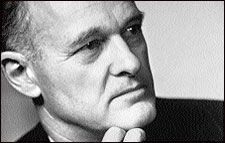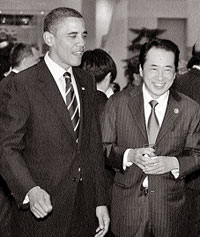Grand strategy
P S SURYANARAYANA in Singapore
The Obama-Hu Jintao interactions bring into focus a strong political
nuance in America’s economic diplomacy towards China.
United States no longer aspires to checkmate China by old-fashioned
containment, with or without apologies to George Kennan, who first
visualized such a US policy
|

George Kennan |
in relation to the Soviet Union six decades ago. During his latest
four-nation Asia tour, which ended on November 14, President Barack
Obama said so in polite terms and even emphasized a new policy line.
Tracing the centre-piece of his policy, Obama said, “I have been very
clear and persistent since I came into office (nearly two years ago)
that we welcome China’s rise.”
In a US-centric perspective, he said, “The fact that China has grown
as remarkably as it has, has lifted millions of people out of poverty,
that is ultimately good for the world and good for America – because it
means that China has the opportunity to be a responsible partner (of the
US).
It (also) means that China can be an enormous market for the United
States, for Korea, for countries throughout Asia and around the world.”
Without the slang of an impromptu comment, Obama’s policy towards
Beijing is based on two strands of thinking about the economic dimension
of China’s rise. First, the US is eager to do voluminous business with
China, given its rise as ‘an enormous market’. Second, Washington is no
less keen to court Beijing as ‘a responsible partner’ in reshaping the
battered global economy.
|

Australian Prime Minister Julia Gillard addressing the G20
summit |
A strong political nuance in Obama’s new economic diplomacy towards
Beijing came into sharp focus following his latest interactions with
Chinese President Hu Jintao.
They had an exclusive conversation in Seoul on November 11, besides
participating together in the Group of 20 (G20) Summit there on the same
day and in the meeting of leaders of the Asia-Pacific Economic
Cooperation (APEC) forum in Yokohama on November 12 and 13.
Obama summed up this nuance without mincing words, “Precisely because
of China’s success, it is very important that (Beijing) act(s) in a
responsible fashion internationally. And the issue of RMB (Chinese
currency) is one that is an irritant not just to the United States, but
is an irritant to a lot of China’s trading partners and those who are
competing with China to sell goods around the world.
(The RMB) is undervalued.
And China spends enormous amounts of money intervening in the market
to keep it undervalued. And so...it is important for China, in a gradual
fashion, to transition to a market-based (currency) system. This is
something that China has done in the past.”
Despite the export-boosting ‘undervaluation’ of the Chinese currency,
Beijing would have to, in Obama’s world view, discover the ‘opportunity’
of becoming America’s ‘partner’.
In his reckoning, such an “opportunity” would alone sustain China’s
phenomenal economic growth going forward.
The real issue before the international community, in this US-China
context, is not the degree of logical soundness in Obama’s reasoning but
the political impact of his perspective.
Hu, for his part, told Obama that Beijing “stands ready to...move
forward the China-US relationship on a positive, cooperative and
comprehensive track”. Outwardly, Hu’s response might sound as being no
more than a much-practised Chinese mantra for engaging the US.
|

Japanese Prime Minister Naoto Kan with US President Barack Obama |
However, the mantra, when decoded, is a formula for China’s
preference for two-way cooperation with the US on the totality of
mutually important issues. These would obviously cover the value of the
Chinese currency as well.
With G20 Summit addressing this issue in order to avert ‘currency
wars’, a catch-phrase in the international media discourse on the
present state of the global economy, Obama lost no time in spelling out
his expectations about China.
Obama’s take on the G20 communique was, “Letting currencies reflect
market fundamentals, allowing your currency to move up and down,
depending on the role that you are playing in the international trading
system, is the best way to assure that everybody benefits from trade
rather than just some.... It means some adjustments for China. And so,
we understand that this is not (going to be) solved overnight (though).”
The overwhelming accent on economic issues in Obama’s official and
public diplomacy towards China was in tune with the season of G20 and
APEC meetings.
At the same time, he did not downplay the importance of
political-military issues in the US-China engagement or the relevance of
economics in his talks with the leaders of America’s allies, Japan and
Australia, on this occasion.
Yet, the primacy of political-military issues in his talks with the
Japanese and Australian Prime Ministers, Naoto Kan and Julia Gillard
respectively, did reveal a subtle game plan.
Of telltale importance were the comments by Kan and Obama after their
talks in Yokohama on November 13. Kan said, “In Japan’s relations with
China and Russia, recently we have faced some problems, and the United
States has supported Japan throughout.... For the peace and security of
the countries in the (East Asian) region, the presence of the United
States and the presence of the US military, I believe, is only becoming
increasingly important.” Kan’s assessments on such issues were confirmed
by Obama wholeheartedly.
“The commitment of the US to the defence of Japan is unshakeable. Our
alliances, bases and forward presence are essential not only to Japan’s
security, they help us ensure stability and address regional challenges
across North-East Asia,” Obama said.
The Frontline |



